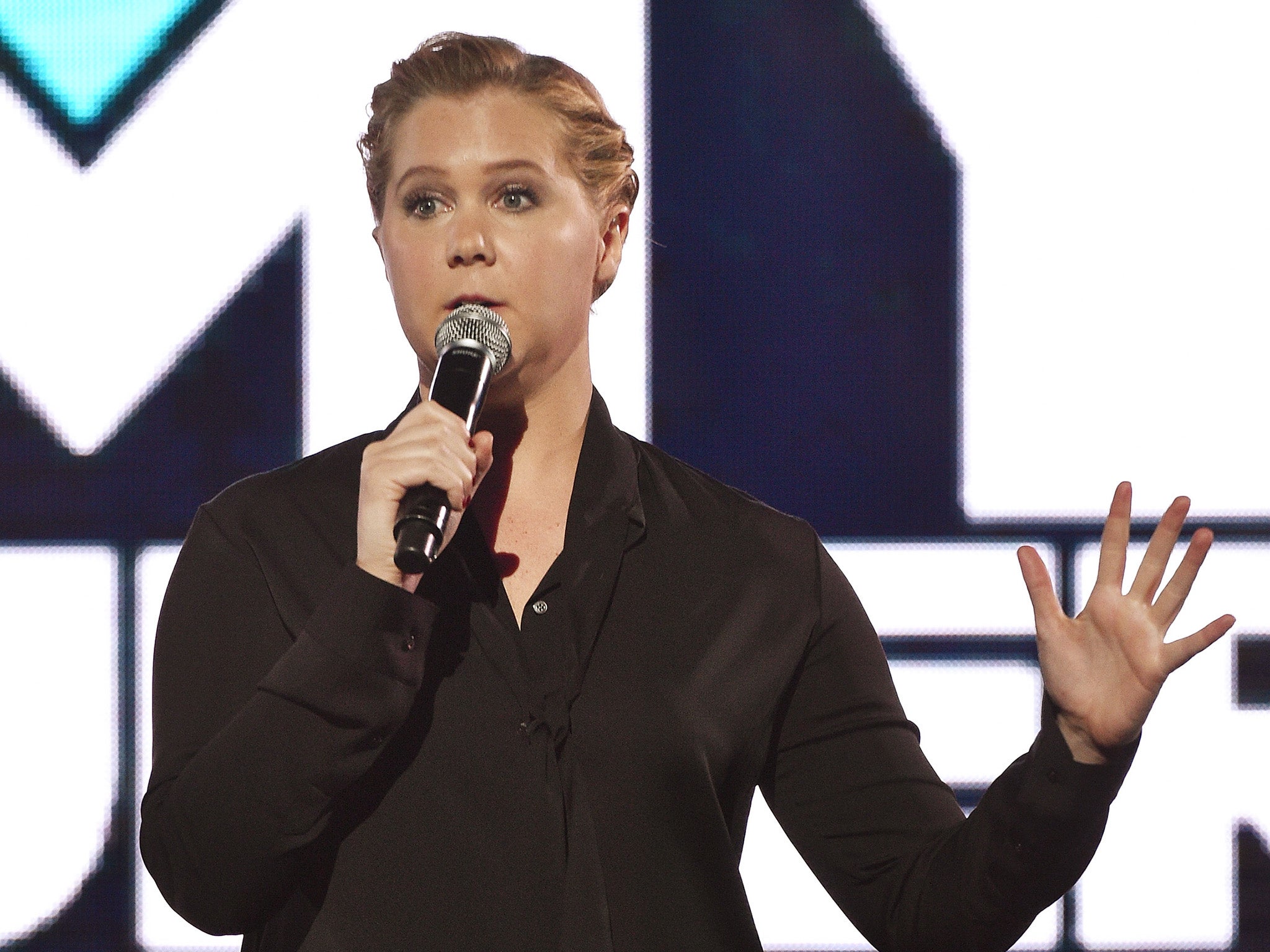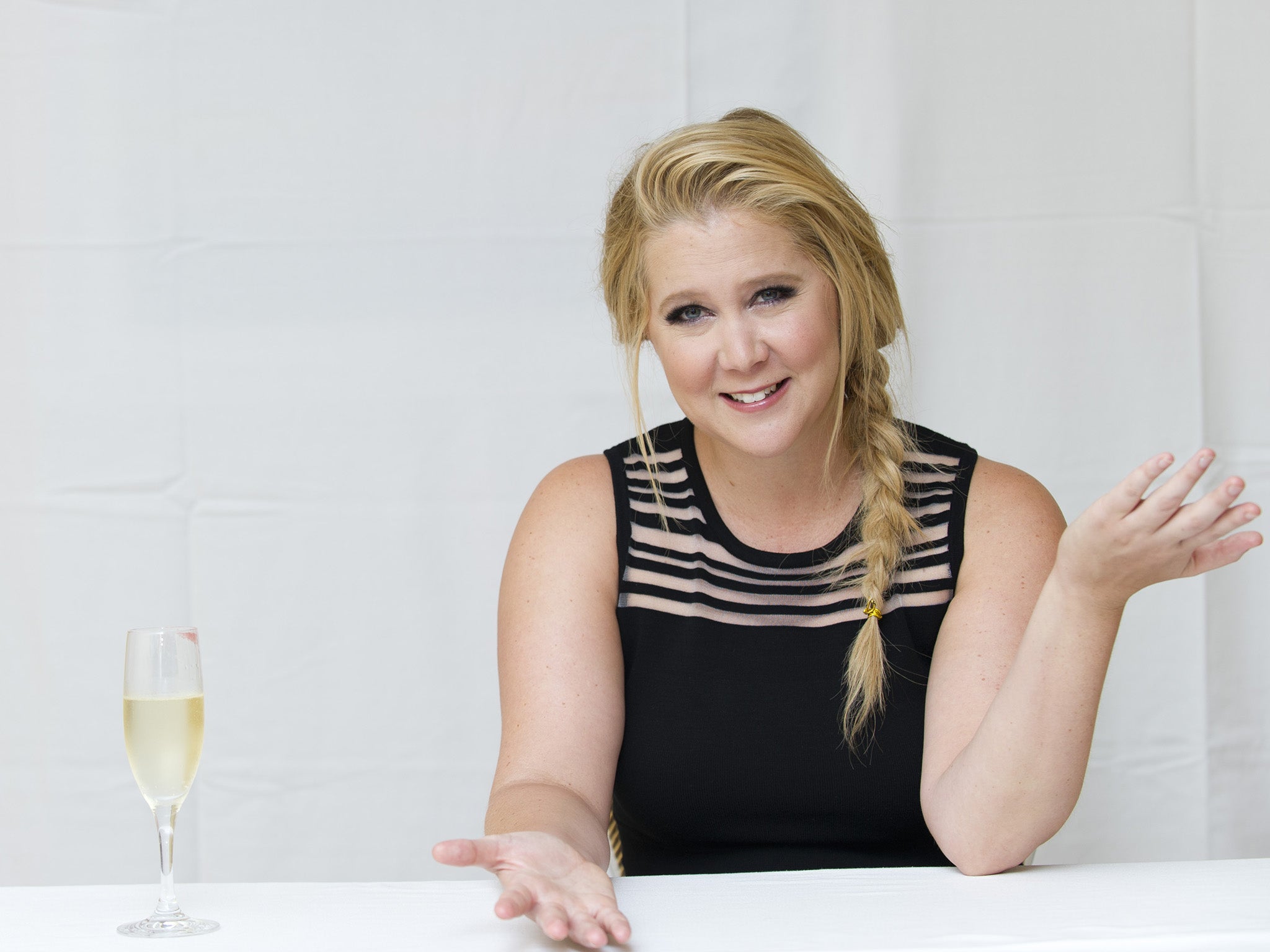Amy Schumer interview: ‘There’s nothing more powerful than not giving a f***’
‘I played a Republican fool, kind of racist, homophobic, everything. Once I started being myself onstage, some felt I lied to them,’ the comedian and actor tells Jason Zinoman

Your support helps us to tell the story
This election is still a dead heat, according to most polls. In a fight with such wafer-thin margins, we need reporters on the ground talking to the people Trump and Harris are courting. Your support allows us to keep sending journalists to the story.
The Independent is trusted by 27 million Americans from across the entire political spectrum every month. Unlike many other quality news outlets, we choose not to lock you out of our reporting and analysis with paywalls. But quality journalism must still be paid for.
Help us keep bring these critical stories to light. Your support makes all the difference.
Since comedian Amy Schumer became pregnant, she had vomited, in her conservative estimate, 980 times. So on a Monday evening last month, when she tells her husband, Chris Fischer, she is going to throw up, sitting in the passenger seat of a compact SUV on her way to perform a drop-in set, what follows has the blase feel of routine.
Keeping his eye on the road, Fischer calmly hands her a bag, and she lowers her face, emits a guttural sound and throws up chunks of shrimp and grits. With hardly a pause, the couple, married for a year, start to banter. “That smells bad,” he says. Schumer shoots back, “You want me to go outside?”
Feigning embarrassment about a marital dispute, he motions towards me in the back seat: “We have a guest.” The car stops, Schumer, who is due in May, gets out, vomits again in front of a church, tosses the bag in a metal trash can and immediately starts joking with her husband again.
This is not mere morning sickness. Schumer suffers from a condition called hyperemesis that makes her feel persistently, relentlessly nauseous, including nearly every time she travels. She has been hospitalised four times. Because of the physical obstacles, Schumer calls her new special, Growing (on Netflix), the most difficult challenge of her career.
I first interviewed Schumer in 2012, and her position since then has changed radically, from relatively unknown club comic to one of the biggest, most polarising names in comedy. She still talks onstage about throwing up, but now it’s because she’s pregnant, not because she’s getting blackout drunk. What also remains constant is a commitment to revealing imperfections and vulnerabilities that others prefer to hide. She has always cared deeply about not caring too much, a contradiction that has fuelled her entire career but that has become increasingly tricky to sustain.
Before the drop-in show, she tells me that she expects the local comics to hate her because of typical disdain for any successful comedians. “Then there’s internet rumours and just the hate out there,” she says. “They hear my name and think whatever, you know. So it’s kind of fun to go in with the deck stacked against you.”
One question I often ask artists is what clique they belonged to in high school: perhaps because it invites no sympathy, no one has ever said the popular crowd, except Schumer.

In showbusiness, she says, she now knows what it’s like to be cool and not cool: “Being cool is powerful in this industry, but there’s nothing more powerful than not giving a f***.”
She is spending two months in New Orleans while her place on the Upper West Side of Manhattan undergoes renovations in preparation for the baby. “Our home is kind of stupid,” she says. “It looks like Tom Hanks’ in Big – karaoke machine, jukebox.”
Over the past decade, New Orleans has been a beloved getaway. She visits several times a year and often holds a New Year’s Eve party with actor Jennifer Coolidge. She has developed a Bill Murray-like reputation around town for goofy, news-generating appearances, like crashing a couple’s engagement photo shoot, joining Mardi Gras practice or painting her face with beignets.
It hasn’t been a quiet pregnancy. She has been touring theatres and shot her special in Chicago. She herself contacted the booker at Saturday Night Live the night before to see if there was a host slot open. There wasn’t, but she still had new ideas to work out, so she headed to a dive bar that holds a weekly standup show.
While she is an actor, screenwriter and author, Schumer remains a comic at heart, always hustling for a laugh, writing notes for jokes in restaurants and processing the world from the stage. “That doesn’t change”, she says, “if you don’t let yourself become crazy from being a famous person.”
She loved acting in Steve Martin’s play Meteor Shower on Broadway, for instance, but says it was frustrating to go onstage and not be able to respond to the news. “I like all the things I’ve done, but my favourite is when I’m in control,” she says. Then, referring to her films Snatched and I Feel Pretty, she added: “The last two movies I didn’t write. I didn’t really have anything to say. I now do.”
Her new special allows fans to catch up with her life, her hellish pregnancy (within the first few minutes, she raises her dress to show her belly) and her marriage to a chef. It’s jarring (and funny) to see the comic who released the special Mostly Sex Stuff now joking about not wanting to sleep with her husband. She also uses motherhood to jab at the backlash to the #MeToo movement. “I hope it’s a girl,” she says, a sarcastic hint in her voice, “because it’s such a scary time for men.”
Schumer’s breakthrough came in 2013 with the Comedy Central series Inside Amy Schumer, a sneakily smart show whose viral sendups of gender double standards and misogyny featured some of the funniest feminist humour in the history of sketch comedy. Then came her hit movie Trainwreck (2015), and she was a movie star, flying in private jets to shows and hanging out with Jennifer Lawrence. (The movie they had been planning is on the back burner; instead she intends to shoot a big-screen adaptation of the play The Humans in the autumn.)
“Young me thought this would bring some other level of joy,” she says, shaking her head at how she pictured being wealthy and famous. “I think I will experience that with a baby. But other than that, it doesn’t exist.”
Success did, however, bring another level of scrutiny. Being a famous comic in 2019 means a stream of criticism every day. If you are a woman, double that. And if you are Amy Schumer, it never stops. She has become a lightning rod, taking criticism from all corners of the internet, periodically finding herself at the bottom of a pile-on.
There were accusations of appropriation and insensitivity when she made a video paying tribute to Beyoncé’s Lemonade. Then there were the YouTube clips of her jokes juxtaposed with the same or similar ones from other comics, suggesting she was a joke thief, and charges of racism about early jokes delivered in the persona of a bigoted fool. (“I used to date Hispanic guys, but now I prefer consensual.”)
“I think people may have been laughing for the wrong reasons,” she says of her early standup, which she now cringes at. “I played a Republican fool, kind of racist, homophobic, everything. Once I started being myself onstage, some felt I lied to them. They felt duped.”
A similar sense of betrayal exists on the left. In the same week that Breitbart ran a story arguing that her comedy fell into “the woke trap”, The Ringer questioned what happened to the progressive comedian of Inside Amy Schumer. The title of the article: “Did We Get Amy Schumer Wrong?”

Schumer’s work has changed, and those who got to know her through her bruising jokes on Last Comic Standing and Comedy Central roasts have different expectations from those who were fans of the feminist satire of Inside Amy Schumer. And in shifting from the sketch television tradition of Chappelle’s Show to that of big-budget Hollywood movies, her comedy has broadened, with some edges softened. (She is still under contract for another season of the show but hasn’t wanted to shoot it until recently.)
I Feel Pretty grossed nearly $100m worldwide, making it one of the top-selling comedies of last year, but it was harshly criticised for its handling of body issues, including the idea that looks don’t matter if you are confident in yourself. Inside Amy Schumer covered similar territory (particularly the perverse effect of systemic objectification on the psyches of women) but without as much of a believe-in-yourself message. While some critics found it glib, Schumer stands by this prescription in part because it worked for her.
“As someone who has been told a million times they are fat and ugly, it does not matter!” she says.
Schumer has always been anchored by a core of confidence, as a photo of her running naked across a park demonstrates. She says she always knew she would be famous and once gave back a $1m book advance because she believed in herself and figured she would get more money when she was more famous in a few years. She was right.
Comic Rachel Feinstein, who has been friends with Schumer for more than a decade, recalled being on a conference call pitching a pilot with Schumer when an executive outlined what the company was looking for. Schumer responded bluntly that they had no interest in doing that. Feinstein couldn’t believe what she was hearing. “Then I get a text from Amy saying: ‘Don’t panic. I know what I’m doing.’ She sold the pilot.” Feinstein added: “She has always encouraged me to ask for things I never would have. I am in awe and try to channel her.”
Even when it comes to her romantic life, she is fearless. A month into dating Fischer, she texted him asking if he was serious about her and if he wanted kids. His response: “I do want kids, and I want them with you.”
But what about those who lack this self-assurance, who can’t shake off the insults that women deal with every day online? Schumer pauses here. “I want to think on that,” she says: “How do you rise from that?” Less than a minute later, she returns to the question: “Therapy, meditation, weed.”
Given the volume and vitriol of the criticism, it’s remarkable how rarely Schumer gets defensive about it. She agrees that her handling of the Beyoncé video was naive. And while she denies she ever stole jokes – parallel thinking is far more common than you might think – she concedes that if she had seen those YouTube videos, she would have thought she was a thief, too. She says that when she asked John Mulaney to give her notes on the special, he kept an eye out for overlap with Ali Wong, who also performed pregnant.
“Comics say we used to be able to say this, and it was funny,” she says. “That’s over, so evolve! I’m down to evolve.”
Yet it’s a difficult balance to remain a comic who doesn’t care how she comes off while also changing with the times in response to criticism of the way she comes off. “I don’t know what’s going to happen with my special – what’s the thing people will be furious about?” Schumer muses aloud. “It sucks to have everyone mad at me. But I’m not too careful.”
Schumer has become close with Lena Dunham in part because of the shared experience of being celebrities on the receiving end of torrents of online criticism. (They were even jointly pilloried for a conversation in Dunham’s now-defunct newsletter, Lenny; some called it tone deaf on matters of #MeToo and race.) “It’s a pretty specific experience,” Dunham says about what bonded them. “Most people don’t know what it’s like to open social media in the morning and hear you are physically, socially and politically worthless.” Dunham adds that Schumer handles it better than she does. “She’s titanium, and part of her skill is the ability to make it look easy.”
But there are signs that being in the fishbowl of fame has taken its toll: a certain caution in her voice, a sighing acknowledgement that people can grow tired of you. She has been attending filmmaking classes at New York University and is looking at a future in the director’s chair.
For her standup, she has recently asked the camera operators shooting her shows to send her clips of crowds laughing at her jokes, proof that people are enjoying themselves. “It’s a good thing to be reminded,” she says, adding that audience members can become abstract, like lab rats in an experiment.

A few years ago, she says, she started to shy away from the public in reaction to the criticism, but an exchange with Dave Chappelle at a Cleveland Cavaliers game helped her out of it. “I was kind of retreating a bit in general after years of getting beaten down, and Chappelle was like: ‘There’s a lot of love out there for you, Amy. I don’t know why, but I heard it.’”
Despite her fears before the drop-in show, Schumer is treated warmly by the MC that night. (“Carnegie Hall, Madison Square Garden and now the Hi-Ho Lounge”, he tells the audience.) Backstage, she spoofs herself, playing the part of the diva sarcastically demanding more bottled water. When she slowly walks onstage, the crowd roars. One woman yells: “Is that really you?” Some chuckle. “Why are you laughing?” Schumer asks. “Because my career has led me back to this place?”
After telling a few jokes about her husband and New Orleans, and adding some random thoughts (“Do you think Jeff Bezos looks like a referee?”), she calms the crowd by confessing: “I threw up on the way over here because I have this disease.” She pauses. “There’s no research on it because men don’t get it.”
After leaving the club, Schumer and her husband walk past a space that showcases standup and burlesque. She had considered performing there, but glancing at it now, she says, “I don’t want to be that cool.”
Then she walks to a parking lot to find that their car has a yellow boot on a back wheel. As her husband looks to call a ride, two men approach. Schumer stays in the car. One offers to remove the boot for $90. Fischer gives him the money, and they are on their way. Schumer cackles with delight: “We are being scammed.”
This was a potentially dangerous situation, but she didn’t act like it. “I get very relaxed in such times,” she says, adding that she respects a good con. “It was the most civil mugging ever.”
Back in New York, I receive a text from her that catches me off guard: “When you first wrote about me, you described me as melancholy,” she says. “I had never seen myself that way, but when I read it, I knew it was true. Am I still melancholy?”
It is characteristically direct, more blunt than the usual interview subject and difficult to answer. She seems both incredibly happy and in love, but also a bit haunted. I say yes.
She agrees, and then expresses the most earnest expectant-motherly sentiment I have heard from her: “I’m ecstatic and furious,” she says, then: “And pleased and peaceful and manic and hopeless and so hopeful it’s crazy.”
© The New York Times
Join our commenting forum
Join thought-provoking conversations, follow other Independent readers and see their replies
Comments